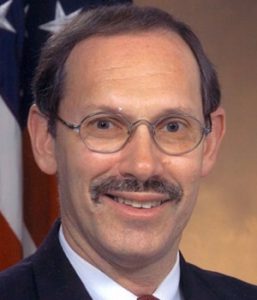
Section 6.1
Promote Biotechnology with U.S. Allies and Partners
Chapter 06
Section 6.1
6.1A
Congress must include biotechnology in the scope of the Department of State’s (DOS) International Technology Security and Innovation (ITSI) Fund to appropriately fund international biotechnology policy, research and development (R&D), and secure supply chains.
6.1B
Congress should direct the Department of State (DOS) and other agencies to promote the U.S. biotechnology industry in foreign markets, including through commercial diplomacy.
6.1C
Congress should expand regulatory diplomacy for biotechnology.
6.1D
Congress should require the Department of State (DOS) to form reciprocal biological data-sharing agreements with other countries.
6.1E
Congress should direct the Department of State (DOS) and the Department of Defense (DOD) to encourage North Atlantic Treaty Organization (NATO) countries to aggregate demand and pool purchasing power for biotechnology products.
Advancing biotechnology is an international endeavor; it requires the United States to identify complementary capabilities, expertise, and resources with allies and partners. The Commission’s recommendations in this section support the federal departments and agencies that engage in biotechnology diplomacy. By pooling their capabilities, the United States and its allies and partners can develop shared solutions to universal challenges.
In recent years, the Department of State (DOS) has greatly expanded its capacity for technology diplomacy, particularly on cyber and digital issues, through the creation of new positions, trainings, and grants. But it and other federal agencies have neither the resources nor the staff needed to cover the breadth and depth of biotechnology diplomacy.

“We have seen our allies and partners make considerable strides in addressing all aspects of biotechnology, recognizing as they do that maintaining the Free World’s lead in all fields is a national security imperative. Working together we will realize synergies that will ensure that lead for years to come.”
Commissioner Dov Zakheim
Recommendation
6.1A
Recommendation 6.1A
Congress must include biotechnology in the scope of the Department of State’s (DOS) International Technology Security and Innovation (ITSI) Fund to appropriately fund international biotechnology policy, research and development (R&D), and secure supply chains.
Congress established the ITSI Fund in 2022 to strengthen telecommunications networks and semiconductor supply chain security, authorizing $500 million over five years.305 This fund is designed to enable the DOS to nimbly deploy resources toward digital diplomacy and high-value cooperation opportunities in the semiconductor sector.
Congress must expand the scope of the ITSI Fund to encompass a wider range of technologies and set aside dedicated funds for biotechnology. The Secretary of State should coordinate with leadership across relevant U.S. departments and agencies to maximize the impact of international biotechnology diplomacy and complement other federal funding sources. The Secretary should also submit annual reports to Congress detailing the use of these funds, including programs, projects, and activities conducted with foreign partners. Suggested programs include coordinated R&D and strengthened global supply chains for biomanufacturing. The DOS should examine how to direct funds and resources to other federal agencies that work with foreign partners on biotechnology to advance shared goals.
Recommendation
6.1B
Recommendation 6.1B
Congress should direct the Department of State (DOS) and other agencies to promote the U.S. biotechnology industry in foreign markets, including through commercial diplomacy.
Commercial diplomacy aims to create business opportunities between countries. It can include trade promotion, economic cooperation, and shared policy development. Multiple federal agencies engage in commercial diplomacy, including the DOS, the Department of Commerce (DOC), the Foreign Agricultural Service (FAS) within the U.S. Department of Agriculture (USDA), and the Office of the United States Trade Representative (USTR). These agencies negotiate bilateral and multilateral trade agreements, coordinate trade missions, and mitigate trade barriers. Expanding market access is particularly critical to ensuring that American biotechnology products sell well internationally. Currently, federal staffing and funding for these activities is insufficient and uncoordinated, particularly when it comes to biotechnology diplomacy.
Congress should ensure that commercial diplomacy efforts for biotechnology are appropriately funded and coordinated. In particular, Congress should direct the DOS, the DOC, the FAS, the USTR, and other relevant agencies to promote the U.S. biotechnology industry in foreign markets, including by offering biotechnology training for Foreign Service Officers (FSOs) (see recommendation 5.1b). The National Biotechnology Coordination Office (NBCO) (see recommendation 1.1a) would help coordinate U.S. government efforts within and across sectors. Congress should also ensure adequate funding for U.S. trade and diplomatic agencies, including the DOS, USTR, and the FAS, to support bioliteracy programs that clearly communicate the benefits and risks of biotechnology, thereby fostering public acceptance and expanding markets.
Recommendation
6.1C
Recommendation 6.1C
Congress should expand regulatory diplomacy for biotechnology.
Different countries regulate biotechnology products through different frameworks, resulting in divergent standards and data requirements. These differences can pose trade barriers and delay the commercialization of useful products. Through regulatory diplomacy, the United States works with other countries to resolve trade barriers that occur due to regulation. As with commercial diplomacy, multiple agencies are involved in regulatory diplomacy, including the DOS, the USTR, the Food and Drug Administration (FDA), the Environmental Protection Agency (EPA), and multiple agencies within the USDA. To be effective, regulatory diplomacy needs to be well-funded, well-staffed, and coordinated across federal agencies.
Commercial diplomacy and regulatory diplomacy are closely linked. Without an efficient regulatory system, there cannot be a thriving global market, and without market demand, governments generally do not prioritize establishing or reforming regulatory frameworks. The Commission recommends that commercial and regulatory diplomacy be coordinated across U.S. agencies and that similar personnel and approaches that are leveraged for commercial diplomacy be used for regulatory diplomacy.
Congress should direct and resource diplomatic, regulatory, and trade agencies to increase and coordinate their efforts on regulatory diplomacy in both bilateral and multilateral settings, including international standard-setting bodies. All these efforts should work toward global regulatory convergence for biotechnology products. Regulatory convergence could include synchronized approvals, shared or concurrent review, or alignment with international standards for risk assessment.
(For more details on expanding regulatory diplomacy for biotechnology, see Appendix G.)
Recommendation
6.1D
Recommendation 6.1D
Congress should require the Department of State (DOS) to form reciprocal biological data-sharing agreements with other countries.
On its own, the United States has a finite amount of high-quality biological data that is AI-ready, limiting the types of advancements it can make. These biological data include:
- Types of biological samples that are particular to a country, such as genetic sequences from native plants, animals, fungi, and bacteria. In Section 4.1 of this report, the Commission recommends a Sequencing Public Lands Initiative to collect new data to drive innovations. The United States could share this data with other countries that are willing to reciprocate. Many other countries, including close allies such as the United Kingdom, Australia, Japan, and South Korea, maintain their own sets of biological data, which include unique data assets (such as data about organisms that cannot be found elsewhere).
- Specific measurement capabilities based on technological advancement. The scientific areas that different countries focus on shape the types of data collection capabilities they have. For example, Australia’s state and federal governments have invested heavily in the study of RNA, which could yield unparalleled capabilities to sequence and measure RNA.306
Despite this wealth of data among U.S. allies, the United States lacks adequate mechanisms to collaborate with these countries to collectively advance biotechnology and other data-driven technologies.
Working with allies on biological data becomes increasingly important when adversaries are building their own large biological data repositories, including through unethical or coercive practices.
To encourage secure and effective collaborations, the DOS, in consultation with the National Institute of Standards and Technology (NIST) and other relevant agencies, should form international agreements and standing bodies with U.S. allies and partners to:
- facilitate reciprocal pooling and sharing of biological data to advance collaborative research;
- implement and enforce data standards to ensure that shared data is AI-ready; and
- reach agreements on the fair collection, storage, and use of biological data that are in line with shared norms and values.
These standards would ensure that adequate informed consent is provided when collecting data and that there is reciprocity of biological data sharing between countries to prevent asymmetries. The agreements should also promote the use of public-private partnerships to bolster collaborative research involving the exchange of biological data, provided there are adequate protections and reciprocity.
These agreements could take the form of new bilateral or multilateral agreements with countries that have a proven track record of robust biodata collection efforts. Or they could leverage existing multilateral relationships such the AUKUS security partnership—especially within Pillar Two, which concerns the collaborative development of advanced technologies—or the Quad or G7.307
Because bilateral and multilateral agreements are established on a project-by-project basis by U.S. researchers and their collaborators, the Commission encourages the DOS to expand these agreements as needed and in a form that most benefits the biotechnology community.
Recommendation
6.1E
Recommendation 6.1E
Congress should direct the Department of State (DOS) and the Department of Defense (DOD) to encourage North Atlantic Treaty Organization (NATO) countries to aggregate demand and pool purchasing power for biotechnology products.
Without clear and consistent government signals for demand, biotechnologies with defense applications will fail to scale. Defense market commitments from the United States alone may not be enough to shift the global landscape for biotechnology, but U.S. allies are also looking to biotechnology to meet their national security needs.
In 2023, NATO members from Europe and Canada collectively spent an estimated $429.2 billion on defense, while the United States spent an additional $875.6 billion on defense.308 The alliance’s 32 member countries represent an untapped market force for biotechnology innovation, which opens up an opportunity for companies to address the combined defense needs of NATO allies.
Establishing joint advance market commitments and offtake agreements to aggregate demand would create stronger market incentives to scale products. Past examples of advance market commitments have been trialed successfully at the international level. For example, with the COVID-19 Vaccines Global Access (COVAX) initiative, the United States and other countries made joint market commitments to biopharmaceutical companies, an effort that proved critical to the successful commercialization of COVID-19 vaccines.309
The United States should encourage NATO countries to aggregate demand and pool their purchasing power for biotechnology products. Congress should direct the DOS, in consultation with the DOD, to develop a diplomatic strategy for establishing a forum within NATO for the purposes of pooling the purchasing power of NATO allies towards emerging biotechnologies. This strategy should:
- determine the criteria for critical needs that could be fulfilled by biotechnology to further NATO’s aims such as biobased energetics;
- establish information-sharing and contracting mechanisms to carry out the advance market commitments and offtake agreements among NATO allies; and
- make an initial determination of U.S. market supply and demand in the biotechnology industry that would meet the needs outlined above.
Upon completion of the strategy, the DOS should report the strategy to Congress, and the DOS and the DOD should carry it out.
Deepen Collaboration with Allies and Partners
Congress should establish a fellowship program for nationals of NATO member states to collaborate with U.S. federal researchers and policymakers on initiatives at the intersection of emerging biotechnology, international security, and defense.
Creating a NATO fellowship program with the express goal of fostering those ties in biotechnology would benefit the United States and its allies. Fellows would work at Congressional offices and federal agencies, providing scientific and technical expertise to advance policies and research.